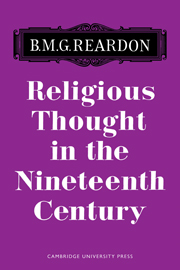Book contents
- Frontmatter
- Preface
- Contents
- Introduction
- PART I EUROPEAN
- PART II BRITISH AND AMERICAN
- 1 Coleridge
- 2 F. D. Maurice
- 3 Newman
- 4 Mansel
- 5 J. S.Mill
- 6 Benjamin Jowett and Essays and Reviews
- 7 Matthew Arnold
- 8 Scott Holland and Lux Mundi
- 9 The British Hegelians
- 10 Emerson
- 11 Josiah Royce
- 12 William James
- Index of Works Cited
- Frontmatter
- Preface
- Contents
- Introduction
- PART I EUROPEAN
- PART II BRITISH AND AMERICAN
- 1 Coleridge
- 2 F. D. Maurice
- 3 Newman
- 4 Mansel
- 5 J. S.Mill
- 6 Benjamin Jowett and Essays and Reviews
- 7 Matthew Arnold
- 8 Scott Holland and Lux Mundi
- 9 The British Hegelians
- 10 Emerson
- 11 Josiah Royce
- 12 William James
- Index of Works Cited
Summary
It could well be claimed that no English theologian of the nineteenth century has exercised a more pervasive and persistent influence than Frederick Denison Maurice. Misunderstood in his own day—he was a man difficult to identify with the views and aims of any ecclesiastical party—and with no great gift as a writer—the opacity of his style has always been a hindrance to the direct dissemination of his ideas—Maurice's teaching, alike in its balance and imaginative scope, has been a valuable corrective to one-sided if more ear-catching opinions. J. S. Mill thought ‘that there was more intellectual power wasted in Maurice than in any other of my contemporaries’, a false judgement which nevertheless contains truth. Yet in October 1853 the Council of King's College, London, scandalized by his refusal to equate ‘eternal punishment’ with ‘everlasting torment’, deemed it their painful duty to state that the continuance of Professor Maurice's connexion with the College as one of its professors would be ‘seriously detrimental to its usefulness’, and dismissed him forthwith.
The son of a Unitarian minister, Maurice was born near Lowestoft in 1805, but was brought up at Frenchay, near Bristol. In 1823 he entered Trinity College, Cambridge, where he attended Julius Hare's lectures, his contemporaries including Alfred Tennyson and John Sterling, the future philosopher, whose sister-in-law, Annie Barton, he eventually married. Later he migrated to Trinity Hall to study law. In days, however, when subscription to the Thirty-Nine Articles of Religion was still a condition of graduation in the ancient universities Maurice's conscience was uncompliant and he left without taking a degree.
- Type
- Chapter
- Information
- Religious Thought in the Nineteenth Century , pp. 254 - 268Publisher: Cambridge University PressPrint publication year: 1966

